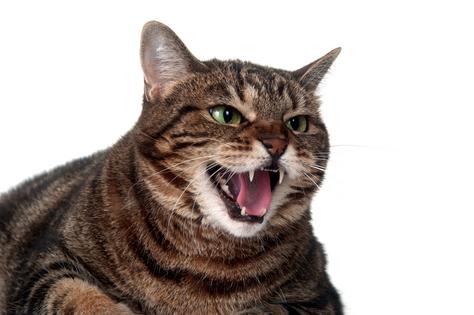My Pet World: When a cat hisses, does that mean he doesn't like you?
Dear Cathy,
The stray tabby that showed up at our door some 10 years ago (he was six months old at the time) has been well cared for, gotten all his shots, and made annual visits with the vet. All in all, he’s had a very spoiled (normal) life here. He has all his claws and is an indoor/outdoor cat who enjoys both environments.
My question is, he recently started hissing. Not at anyone, but he'll amble down the hallway and let out a Metro-Goldwyn Mayer lion-type yawn with a hiss. When it started, a friend with lots of cats scoffed, and said, "It's hairballs." But its frequency increased so much we took him to the vet. Our regular doctor was out of town, and the doctor on duty could find nothing wrong. They took x-rays and examined him, and everything looked great: no blockages, fish bones, or whatever stuck in the passageway.
That was about three weeks ago, but now the yawn/hiss is becoming regular. It's not in anger (necessarily), as he can be in your lap and hiss as you pet him. Is he just becoming a "grumpy old man," or what? Should we revisit the vet, albeit the one that's known him for 10 years?
— Peter, Monkton, Maryland
Dear Peter,
Very often, people think that when a cat hisses at them, the cat must not like them. That’s not true because cat hissing is considered an involuntary reaction that occurs when a cat is startled, stressed, afraid, overstimulated, or in pain. So, I am glad you realize that it’s nothing personal and are considering all the possibilities.
First, rule out illness and pain. So, yes, please visit your regular doctor who may suggest bloodwork. Veterinarians recommend that every dog and cat get bloodwork done annually when they become a senior pet, which happens around 10 years old for cats. Even if they don't find anything, this is an excellent way to get in front of future health issues.
Your friend is also right that it could be hairballs even if he didn’t vomit any. Cats that are losing their hearing also startle easily and will hiss, so please talk to your vet about both these possibilities.
Next, if there’s no health problem, is he getting startled by something? Pay attention to when he is hissing. Has he been overstimulated or overwhelmed right before this happens? Did someone make a loud noise, drop something, or run through the house? If yes, that is something you can manage for him.
Finally, he may be stressed for reasons that range from changes to his routine or your routine to new people visiting or moving into the home, family members leaving (going off to college, for example), or even someone close to him dying recently.
If he’s healthy and there is nothing startling him, then talk to the vet about treating him for stress. You also can buy over-the-counter calming treats and feline pheromone collars, plug-ins, and sprays to create a more calming environment for him. But don’t do this before talking to the vet first. The frequency of the hissing makes me think it’s a health issue.
Dear Cathy,
Do some animals, especially dogs, know when the time has come to cross Rainbow Bridge? My 11-year-old Border Collie Lab mix has cancer, and I know it's just a matter of time before she is gone. She is still playing, eating, drinking, pooping, and peeing. Any words would be appreciated.
— Anthony, Lynbrook, New York
Dear Anthony,
I am sorry that your dog has cancer. I know this must be a tough time for you.
I don't know if animals know when they are going to pass over the Rainbow Bridge. Sometimes, I think they know when their owner or another pet in the family is dying, but I am not sure if they know when they are dying. Animals are great at living in the moment — enjoying all life has to offer — food, play, and time with the people they love. They exude pure joy and show great love to us, often up until their final moments. We are lucky to have them in our lives.
If she is still playing, eating, drinking, etc., use these last days enjoying her companionship, giving her special joys (like a special treat or car ride, whatever her favorite thing is to do), and hugging and petting her as much as possible. A part of her will always remain with you, and a part of you with her. The love we share with our animal companions never ends.
_____
_____
========
(Cathy M. Rosenthal is a longtime animal advocate, author, columnist and pet expert who has more than 25 years in the animal welfare field. Send your pet questions, stories and tips to cathy@petpundit.com. Please include your name, city, and state. You can follow her @cathymrosenthal.)
©2023 Tribune Content Agency, LLC.
(c) 2023 DISTRIBUTED BY TRIBUNE MEDIA SERVICES, INC.












Comments